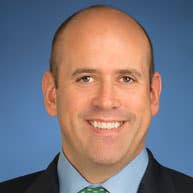
This morning, Goldman Sachs posted second-quarter earnings that beat analysts' expectations by more than a comfortable margin. To be sure, "comfortable" was Goldman's word of the day — executives used it repeatedly on a conference call this morning as a way to deflect answering questions from analysts about whether the bank was in compliance with newly proposed leverage rules.
The rules, jointly put out last week by the Federal Reserve, Securities and Exchange Commission, and Office of the Comptroller of the Currency, would mandate that the eight largest U.S. banks fund their assets (mostly loans and investments) with 5% percent of capital as opposed to debt and that their Federal Deposit Insurance Corp.-insured subsidiaries be funded with 6% capital by 2018.
Banks would calculate their leverage ratio under the proposed new rules by using their total assets, and would not be allowed to adjust or lower them for risk like they are under a separate set of requirements. The reasoning behind higher capital requirements is that it provides banks with a buffer against large losses so that they don't have to go bankrupt if a certain amount of their assets — loans and investments — go bad. The 6% ratio for the insured subsidiary would be double the international standard mandated by a global group for regulators.
During today's earning call, eight different analysts tried to get Goldman Sachs Chief Financial Officer Harvey Schwartz to comment on where Goldman was with the new proposed rules. Schwartz rebuffed them every time, using several variations of how the bank was "comfortable" with its position and noting that the rules were not yet finalized.
For instance, in a response to a question from Michael Carrier of Bank of America, Schwartz said, "Our first assessment is we're very comfortable with where we are," and that, "We are comfortable, and we will see how the final rule goes and work with the regulators." Immediately following Carrier, Betsy Graseck of Morgan Stanley asked Schwartz, "On the leverage ratio when you say you are comfortable, what's your definition of comfortable?"
Schwartz's response: "Comfortable. I'm not trying to be cute with you."
When Graseck followed up by asking if by "comfortable" Schwartz meant that Goldman would hit the requirements by the proposed 2018 deadline, Scwhartz interrupted her and said, "Oh, sorry, by comfortable, I don't mean the time frame."
Later, Mike Mayo, the famously blunt analyst for CLSA, told Schwartz, "I think the word of the day is 'comfortable,' and I will ask you the fifth or six question on the leverage. You are comfortable with where you are. You are saying, 'Trust us, we'll be there'; on the other hand you are not disclosing a number like your peers have done and perhaps other peers will do ... I'm just trying to reconcile the two thoughts."
Schwartz replied, "When we have real confidence in the exact number, then we'll be fine to share it with you. Maybe 'comfortable' is the word of the day, but we are comfortable."
Mayo persisted, "Can you just give us a sense of it's above some number and give us that number?"
"You are looking for shades of gray in comfortable," Schwartz said. "Pretty comfortable."
Goldman's repeated refusal to supply specifics on its leverage ratio related to the proposed new rules is diametrically opposed to its main rival JP Morgan Chase, as well as Citi and Wells Fargo.
During its earnings last Friday, JP Morgan Chase gave detailed information about its holding company's leverage ratio, saying it stood at 4.7% and was thus short of the proposed ratio and that its subsidiary was short as well. Its chief financial officer, Marianne Lake, said in response to questions on its earnings call that "closing that gap should not be difficult and could be more quick" than meeting it by 2015, which is what the bank estimated. Jamie Dimon, JPMorgan's chairman and CEO, criticized the new rules, saying he supported the international regulations but that the extra capital requirements proposed by U.S. regulators meant that "clearly we are no longer talking about harmonization."
Citi also was more forthcoming than Goldman on the new leverage ratio issue. That bank's CFO John Gerspach, said yesterday that its holding company leverage ratio was at 4.9% in the second quarter and surpassed 5% in June. Wells Fargo CEO John Stumpf said on Friday that its holding company and insured subsidiary exceeded both proposed ratios.
Morgan Stanley and Bank of America, the other two mega-banks that would be affected by the proposed rule, report their earnings later this week.
As for Goldman's earnings, well, they crushed them. The bank reported earnings per share of $3.70, solidly beating analysts' estimates of $2.89. It collected $8.6 billion of revenue and generated $1.9 billion of profit over the three months ended June 30.
